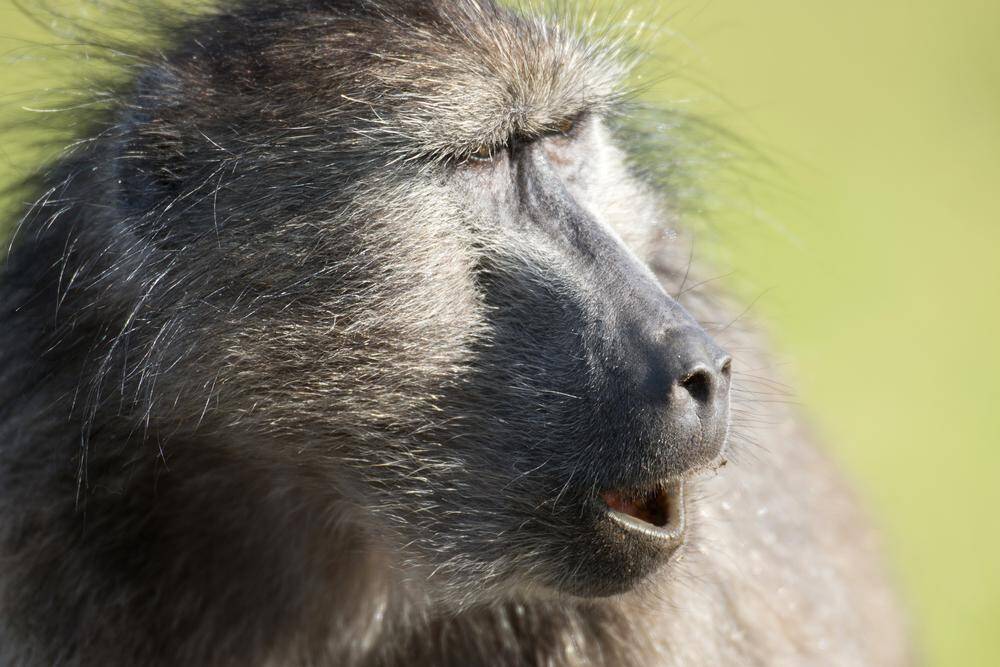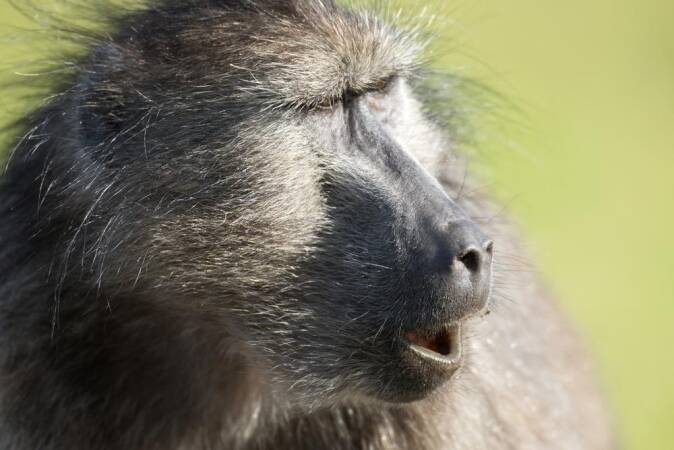

If you come across an animal with thick, greyish-brown fur, a dog-like snout, prominent canine teeth, a tail, and a distinct red backside, you’re likely observing an African baboon. While not typically considered a primary or secondary trophy in South African game hunting, baboons are often included in specialty hunting experiences as part of broader game hunting packages.
African baboons are native to Southern Africa, inhabiting countries such as Angola, Botswana, Mozambique, Namibia, South Africa, and Zambia. These adaptable animals thrive in diverse habitats, including woodlands, savannas, steppes, semi-arid regions, and mountainous terrains. Living in social groups known as “troops,” their group size can vary significantly, ranging from as few as eight members to over 200. Male baboons dominate these troops and are notably aggressive, with weights averaging around 70 pounds but reaching as much as 99 pounds in larger individuals.
Baboons communicate using a combination of 10 vocalizations, along with facial expressions and gestures. For hunters or observers on safari, recognizing their open-mouthed threat display—where they snarl and expose their formidable canine teeth—can be crucial. This gesture is a clear warning: they’re not to be underestimated.
As for predators, baboons must be vigilant against lions, Nile crocodiles, hyenas, and leopards. Leopards, in particular, often target younger or juvenile baboons since fully grown adults can be quite challenging to capture.
In terms of diet, baboons are opportunistic omnivores. Grass makes up a significant portion of their meals, but their diet also includes seeds, pods, berries, blossoms, roots, bark, and leaves. Occasionally, they consume insects and small amounts of meat such as fish, shellfish, hares, birds, vervet monkeys, and even small antelopes. Baboons have also been known to attack livestock, such as goats or lambs, in pursuit of an easy meal.
Whether you’re observing their intricate social behavior or encountering them on a hunting expedition, baboons are fascinating creatures that add a unique dimension to any South African game safari.
Name:
Papio
Weight:
46-99 pounds
Range:
Southern Africa
Mating Season:
All Year Around
Life span:
20-30 years
Baboons are Seen as Pests Due to the Damage they Cause to Both Crops and Livestock.
Baboons are large-bodied monkeys with a strong build and thick fur. They have a large head with a long, dog-like muzzle, cheek pouches, powerful jaws, and sharp canine teeth. They walk on all fours with sharp claws on each leg, carrying their tail in a characteristic arch. This tail isn't used as a hand, but baboons can still climb when necessary. One of the most easily recognizable things about a baboon is its red backside. Male baboons have red butts that primatologists believe help to attract females and warn off potential predators.
Baboon hunting on a hunting safari is quite simple, as it is purely by chance that you usually come across them and when you do, almost any firepower goes. You can hunt baboons throughout the year, with the only time it is not actively recommended is during the wetter months of December – January, when the summer rains make roads and trails mushy and difficult to navigate.
Baboons are purely chance trophies and are quite cheap to hunt. They are pests, and many farmers are eager to rid their lands of the vermin that eat their crops and attack their livestock. Returning from hunting in Africa, this specialty trophy will be quite different and rather unique, if compared to other typical big game animals and other popular species that form part of a game hunting safari.
The best rifle is a small to medium caliber rifle fitted, with a good scope. Anything from a .270 to a .375. Baboons are exceptionally clever and evasive. They are opportunistic prey, and often game hunters end up taking “potshots” at great distances when game hunting in South Africa. Shoot for the center of the chest. A 300 win-mag is also an excellent choice for the longer shots loaded with a minimum of 165 grain.
Baboon hunting in South Africa offers a unique and thrilling experience for hunters seeking an opportunistic trophy in the African wilderness. As one of the most adaptable and intelligent primates, baboons present an exciting challenge during your hunting safari. While not a primary target, they are often hunted as part of a larger game package, adding diversity and excitement to any African safari.
With their keen senses and sharp instincts, baboons are known for their cunning and evasive nature, making them a worthy addition to your hunting adventure. Whether you encounter them while tracking other game or specifically target them as part of a specialty hunt, baboon hunting provides a distinct and memorable experience.
Baboons are often considered pests due to the damage they cause to crops and livestock in rural areas of South Africa. Farmers and landowners encourage hunting them to control populations and protect their livelihoods. This makes baboon hunting both an exciting opportunity for hunters and a practical form of wildlife management.
In South Africa, you can hunt baboons in various terrains, including woodlands, savannas, and mountainous regions, where baboon troops are commonly found. These animals are clever and quick, making them a challenging and rewarding target for hunters who enjoy testing their marksmanship and tracking skills.
Baboon hunting is generally opportunistic, meaning hunters often come across these animals while pursuing other game. However, tracking and targeting baboons can be an exciting part of the overall safari experience. Several methods can be used for hunting baboons:
Selecting the right firearm is essential for a successful baboon hunt. Due to their size and agile nature, a small to medium-caliber rifle is usually sufficient. Popular choices include:
A good scope is also recommended, as baboons are often spotted at longer distances, making precision shooting necessary.
Hunting baboons can be more challenging than it initially appears. Baboons are highly intelligent and have evolved to avoid predators, including humans. Their sharp eyesight, keen sense of smell, and group dynamics make them difficult to hunt. Once a baboon spots danger, it will alert the entire troop with loud warning calls, making the hunt more difficult.
However, the reward of successfully hunting a baboon is not only the unique trophy but also the satisfaction of outsmarting one of Africa’s most intelligent animals. Additionally, baboon hunting is relatively inexpensive, making it an excellent option for hunters looking to add variety to their safari without breaking the bank.
Yes, baboon hunting is legal in South Africa, and they are often hunted to control population numbers and reduce damage to crops and livestock.
Baboon hunting can be done year-round, but the best time is during the drier months from April to October, when the animals are more active and easier to spot.
Yes, you will need the appropriate hunting permits, which your outfitter can help you acquire before your safari begins.
Spot and stalk is the most common method, but hunting from blinds or using calls can also be effective.
While baboons are not typically aggressive, they can defend themselves with their sharp canine teeth if cornered. It’s essential to approach with caution.
A small to medium-caliber rifle like a .270 or .300 Win Mag is ideal for hunting baboons due to their size and agility.
Yes, baboon hunting is often part of a larger game hunting package and can be combined with other species like impala or kudu.
Baboon meat is not typically eaten by hunters, and the animal is primarily hunted for population control and as a trophy.
After the hunt, the baboon can be skinned, and the skull or hide is often kept as a trophy.
Yes, when done according to regulations, baboon hunting is considered ethical and contributes to local conservation efforts by managing baboon populations.
Search from our range of Hunts across various popular destinations in Africa.
Find A Hunt